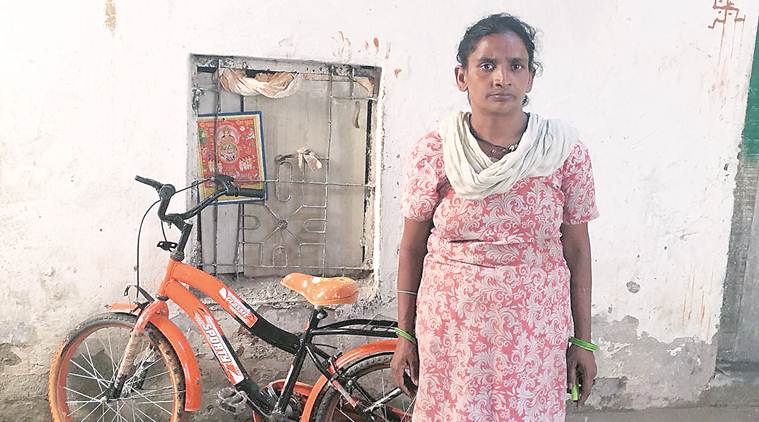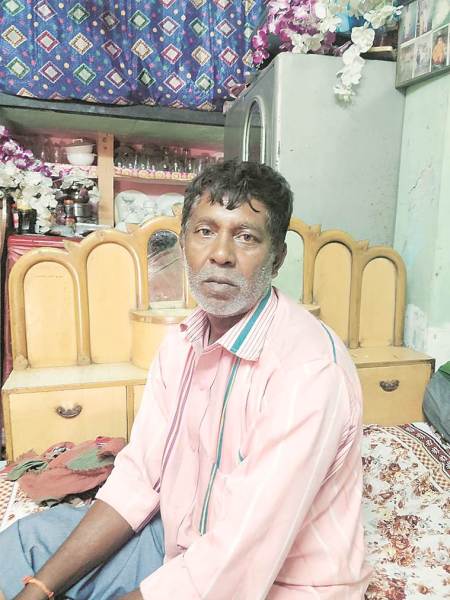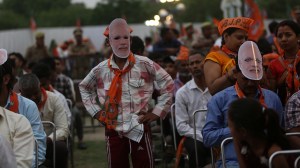- India
- International
Delhi: Over 20 sewer deaths since last year, relatives of victims find little closure
The Indian Express tracked down five families to report on the challenges they faced in the aftermath — compensations stuck, harassed over debts.
 Rani allegedly tried to kill herself after her partner died cleaning a sewer.
Rani allegedly tried to kill herself after her partner died cleaning a sewer.
Since 2017, 22 people have died cleaning sewers, septic tanks and rainwater harvesting pits. Over the course of a week, The Indian Express tracked down five families to see if they have received compensation, and the challenges they faced in the aftermath of the deaths.
* Anil (37), died while cleaning a sewer in Dabri Extension on September 14: Tired by incessant questions about his death, and about the Rs 50 lakh in donations she received in the aftermath, his partner Rani (30) allegedly tried to kill herself.
Following Anil’s death, a photo of Rani’s child crying next to his body had gone viral, and a crowd-funding website, in coordination with an NGO, had raised over Rs 50 lakh for the family. But Anil’s parents came forward and claimed he and Rani never married, following which the compensation got stuck pending a probe.
ALSO READ | Man drowns while cleaning Delhi Jal Board sewage tank
On September 8, Rani shut herself inside her one-room house and set her clothes on fire, but was saved by her neighbours.

“I was angry… The public, police and media keep asking me questions, how many people will I answer? People keep harassing me thinking I am rich, but I don’t have any money,” said Rani. She now has Rs 18,500 to sustain herself.
 Yusuf said the death of his sons changed his life forever.
Yusuf said the death of his sons changed his life forever.
* Ravinder Kanojia (40), among three dead in a gas leak at Taj Vivanta hotel on May 1: The hotel gave Rs 10 lakh to pump operator Ravinder’s family, helped them open bank accounts and set up a fixed deposit account.
Following news of the compensation, however, a group of men turned up outside Ravinder’s house and asked the family to pay back his debts. “We spent around Rs 5 lakh for that. They thought we were rich with donations,” said Taruna, Ravinder’s wife.
Taruna, now bogged down with jaundice, visited the Chief Minister’s office and was directed by officials to go to Patiala House Court to state their case for compensation from the government, and submit an application for legal representation. She then had to visit the SDM office in Jamnagar, where she was told by authorities that the maximum they could get was Rs 25,000 as her husband was not a manual scavenger.
Taruna then visited the Widow Pension Kendra in Geeta Colony to submit forms. But these were rejected as she sported a bindi in the photo. “I was told that I don’t look like a widow. After getting a new photo, I went to the office again to be told that the procedure was online. I am a single mother of two girls… the need for a male family member is felt while visiting these offices,” Taruna said.
Shilpa, the eldest daughter who is in college, said, “My father was a pump operator… It was not his job, but he was asked to enter the STP. We have been branded manual scavengers… people do not talk to us anymore.”
n Brothers Aijaz (22) and Jahangir (25) died cleaning a septic tank in the basement of an Anand Vihar mall in August 2017: Sitting on a bed adjacent to a small TV in his Seemapuri home, Yusuf (50) said the death of his sons changed their lives forever.
Jahangir’s family received around Rs 35 lakh in compensation from the mall authorities, Delhi government and a local MLA.
Yusuf purchased a 70-sq-ft plot for Jahangir’s wife and children in Seemapuri. The property has been rented out to a local scrap dealer, who pays them a rent of Rs 10,000. Due to family differences, Aijaz’s family went back to their village in Purnia. A year on, Yusuf continues to work as a garbage collector at the same mall where his sons died. “I cannot do any other work at this age… but mall authorities have become extra cautious and do not give me strenuous work,” he said.
* Ammi (28) died cleaning a sewer in Lajpat Nagar in August 2017: Within two weeks of Ammi’s death, an FD account of Rs 10 lakh had been opened for his son Veer (6), now studying at a government school. His wife Rekha (31) was provided a job as a cleaner in the Public Works Department. She said she earns enough to pay rent and the school fee.
Ammi’s brother Sonu (43) is unsure if the police probe into the death will lead anywhere: “We have spoken to the police, but we don’t know how and when we will get justice,” he said.
* Joginder (32), among 3 dead cleaning a sewer in Lajpat Nagar in August 2017: In a row of rooms with cracked wooden doors in Khichripur live Joginder’s four brothers. They, too, used to clean sewers until his death.
“We will never enter a sewer again. I contracted skin infections and sustained injuries on my hands and legs… treatment costs around Rs 1,600 a month,” said Ajay Kumar (45), Joginder’s eldest brother. He and two of his brothers now work as daily-wage labourers.
Within 10 days of Joginder’s death, the family received Rs 10 lakh compensation from the Delhi government, of which they used Rs 7 lakh to pay off debts.
Apr 24: Latest News
- 01
- 02
- 03
- 04
- 05







































